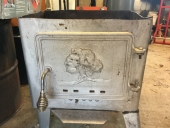
 25
25




The little engine that could.
NomadicRanch
Bionoculars,Cast Iron skillets,crock pots,Military gear/shovelsWoodworking tools,Rugged Cameras,rechargeable flashlights,Solar technology,tents,pack saddles,well made backpacks send to Benjamin Skiba p.o.box 1132 Teec Nos Pos Az 86514 items benefit sheepherders and surrounding community will be distributed

 5
5




* Follow your curiosity , Do what you Love *
Permaculture page on Simperi website
 6
6




'What we do now echoes in eternity.' Marcus Aurelius
How Permies Works Dr. Redhawk's Epic Soil Series
 4
4




Pineywoods of east Texas.


 13
13




The little engine that could.
NomadicRanch
Bionoculars,Cast Iron skillets,crock pots,Military gear/shovelsWoodworking tools,Rugged Cameras,rechargeable flashlights,Solar technology,tents,pack saddles,well made backpacks send to Benjamin Skiba p.o.box 1132 Teec Nos Pos Az 86514 items benefit sheepherders and surrounding community will be distributed


 5
5




Joylynn Hardesty wrote:Beautiful story. Do the Navajo have relationships with birds of prey? I love the below news story.
A southern Indian state is using trained birds of prey to take down rogue UAVs as part of local policing.
The little engine that could.
NomadicRanch
Bionoculars,Cast Iron skillets,crock pots,Military gear/shovelsWoodworking tools,Rugged Cameras,rechargeable flashlights,Solar technology,tents,pack saddles,well made backpacks send to Benjamin Skiba p.o.box 1132 Teec Nos Pos Az 86514 items benefit sheepherders and surrounding community will be distributed
 2
2
















 5
5




Ben Skiba wrote:Chapter 2 The Sky Shepherd

* Follow your curiosity , Do what you Love *
Permaculture page on Simperi website


 3
3




Very good eyes sir.The photo is from Carrizo mountain the neighboring mountain we live at the base of it.Chuska mountain range is in the the backround which is part of Lukachukai.I've cut firewood up there.Aspen and pondorosa.The pictures from one of many years we've done the anual trailing of the sheep.Where we go from around 5,000 feet to 8,000 ft.the highest point is about 9,000 and sum feet..Phil Stevens wrote:I like the scenes and main character a lot, Ben. Is that photo from the northern end of the Lukachukai? I recognise that view from a trip I took 25 years ago on the way to the San Juans. I really hope I can get back to the mesas someday.
The little engine that could.
NomadicRanch
Bionoculars,Cast Iron skillets,crock pots,Military gear/shovelsWoodworking tools,Rugged Cameras,rechargeable flashlights,Solar technology,tents,pack saddles,well made backpacks send to Benjamin Skiba p.o.box 1132 Teec Nos Pos Az 86514 items benefit sheepherders and surrounding community will be distributed


 11
11




The little engine that could.
NomadicRanch
Bionoculars,Cast Iron skillets,crock pots,Military gear/shovelsWoodworking tools,Rugged Cameras,rechargeable flashlights,Solar technology,tents,pack saddles,well made backpacks send to Benjamin Skiba p.o.box 1132 Teec Nos Pos Az 86514 items benefit sheepherders and surrounding community will be distributed


 10
10




The little engine that could.
NomadicRanch
Bionoculars,Cast Iron skillets,crock pots,Military gear/shovelsWoodworking tools,Rugged Cameras,rechargeable flashlights,Solar technology,tents,pack saddles,well made backpacks send to Benjamin Skiba p.o.box 1132 Teec Nos Pos Az 86514 items benefit sheepherders and surrounding community will be distributed

|
Yeah, but how did the squirrel get in there? Was it because of the tiny ad?
Looking for cold-climate growers to join a GOOF livestream panel (Missoula)
https://permies.com/t/369111/cold-climate-growers-join-GOOF
|




